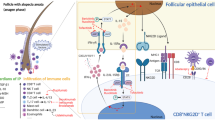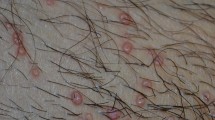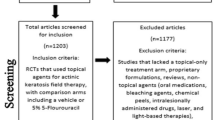Abstract
Purpose
Oral mucositis (OM) is a common complication of cancer treatment that has an impact on a patient’s quality of life and the outcome of cancer therapy. This trial evaluated the effect of thyme honey oral gel for the prevention of chemotherapy-induced OM.
Methods
One hundred ten breast cancer patients who received their first cycle of chemotherapy with adriamycin (60 mg/m2) and cyclophosphamide (600 mg/m2) were randomly recruited into two groups: group A were patients who followed general oral hygiene recommendations and rinsing saline 3 times a day, and group B were patients with similar protocol but supplied with our formulated oral gel to be applied 2 to 4 times a day. Patients were assessed by the World Health Organization (WHO) oral mucositis grading scales and self-assessment daily questionnaire.
Results
The use of thyme honey was associated with diminishing incidence of OM grade ≥ 2 (95% CI, 0.12 to 0.90; P = 0.030), duration of OM (− 3.36 days; 95% CI, − 5.50 to − 1.22; P = 0.037) and delayed occurrence of OM grade ≥ 2 (95% CI, 0.10 to 0.80; P = 0.017).
Conclusion
Thyme honey can be considered as a prophylactic agent for OM and decrease the severity of its symptoms.
Trial registrations
This protocol was registered at the Iranian Registry of Clinical Trials: registration number IRCT201506063106N25, on June 12, 2015; approved by the institutional review board at the Deputy of Research, Pharmaceutical Sciences Branch, Islamic Azad University, Tehran, Iran; and approved by the Ethics Committee of Medical Researches of Pharmaceutical Sciences Branch of Islamic Azad University, Tehran, Iran—reference number 5936, on August 17, 2014.



Similar content being viewed by others
References
Seung AH (2013) Adverse effect of chemotherapy and targeted agents. In: Alldrege BK, Corelli RL, ErNsT ME et al (eds) Applied therapeutics, 10th edn. Wolters Kluwer Health, Philadelphia, pp 2115–2118
Leenstra JL, Miller RC, Qin R et al (2014) Doxepin rinse versus placebo in the treatment of acute oral mucositis pain in patients receiving head and neck radiotherapy with or without chemotherapy: a phase ш, randomized, double-blind trial (NCCTG-N09C6 [Alliance]). J Clin Oncol 32:1571–1577
Sharon E, Karis Kin Fong Cheng RN, Barasch A, Lalla RV et al (2020) MASCC/ISOO clinical practice guidelines for the management of mucositis secondary to cancer therapy. Cancer 126:4423–4431
Vallianou NG, Gounari P, Skourtis A et al (2014) Honey and its anti-inflammatory, anti-bacterial and anti-oxidant properties. Gen Med. https://doi.org/10.4172/2327-5146.1000132
Jull AB, Rodgers A, Walker N (2015) Honey as a topical treatment for wounds. Cochrane Database Syst Rev. https://doi.org/10.1002/14651858.CD005083.pub4
Charalambous M, Raftopoulos V, Lambrinou E et al (2013) The effectiveness of honey for the management of radiotherapy-induced oral mucositis in head and neck cancer patients: a systematic review of clinical trials. Eur J Integr 5:217–225
Jayachandran S, Balaji N (2012) Evaluating the effectiveness of topical application of natural honey and benzydamine hydrochloride in the management of radiation mucositis. Indian J Palliat Care 18:190–195
Hawley P, Hovan A, McGahan CE et al (2014) A randomized placebo-controlled trial of manuka honey for radiation-induced oral mucositis. Support Care Cancer 22:751–761
Hashemian F, Baghbanian N, Majd Z et al (2015) The effect of thyme honey nasal spray on chronic rhinosinusitis: a double-blind randomized controlled clinical trial. Eur Arch Otorhinolaryngol 272:1429–1439
Botelho MA, Nogueira NA, Bastos GM et al (2007) Antimicrobial activity of the essential oil from Lippia sidoides, carvacrol and thymol against oral pathogens. Braz J Med Biol Res 40:349–356
Guo N, Liu J, Wu X et al (2009) Antifungal activity of thymol against clinical isolates of fluconazole-sensitive and -resistant Candida albicans. J Med Microbiol 58:1074–1079
Worthington HV, Clarkson JE (2002) Prevention of oral mucositis and oral candidiasis for patients with cancer treated with chemotherapy: Cochrane systematic review. J Dent Educ 66:903–911
De Castro RD, de Souza TM, Bezerra LM et al (2015) Antifungal activity and mode of action of thymol and its synergism with nystatin against Candida species involved with infections in the oral cavity: an in vitro study. BMC Complement Altern Med. https://doi.org/10.1186/s12906-015-0947-2
Aslani A, Zolfaghari B, Davoodvandi F et al (2016) Design, formulation and evaluation of an oral gel Punica Grantum flower extract for the treatment of recurrent aphthous stomatitis. Adv Pharm Bull 6:391–398
Songkro S, Rajatasereekul N, Cheewasrirungrueng N (2009) In vitro studies of mucoadhesiveness and release of nicotinamide oral gels prepared from bioadhesive polymers. Int J Pharmacol Pharm Sci 3:109–116
Erowele GI, Ndefo UA (2009) Oral mucositis: update on prevention and management. US Pharm 34:10–14
Blagden SP, Charman SC, Sharples LD et al (2003) Performance status score: do patients and their oncologists agree? Br J Cancer 89:1022–1027
Erowele GI, Ndefo UA (2009) Oral mucositis: update on prevention and management strategies. US Pharm 34:10–14
Kushner JA, Lawrence HP, Shavol I et al (2008) Development and validation of a Patient-Reported Oral Mucositis Symptom (PROMS) scale. J Can Dent Assoc 74:59–59i
Gussgard AM, Hope AJ, Jokstad A et al (2014) Assessment of cancer therapy-induced oral mucositis using a patient-reported oral mucositis experience questionnaire. Plos One. https://doi.org/10.1371/journal.pone.0091733
Stiff PJ, Erder H, Bensinger WI et al (2006) Reliability and validity of a patient self-administered daily questionnaire to assess impact of oral mucositis (OM) on pain and daily functioning in patients undergoing autologous hematopoietic stem cell transplantation (HSCT). Bone Marrow Transplant 37:393–401
Stiff PJ, Emmanouilides C, Bensinger WI et al (2006) Palifermin reduces patient-reported mouth and throat soreness and improves patient functioning in the hematopoietic stem-cell transplantation setting. J Clin Oncol 24:5186–5193
Blijlevens N, Schwenkglenks M, Bacon P et al (2008) Prospective oral mucositis audit: oral mucositis in patients receiving high-dose melphalan or BEAM conditioning chemotherapy—European Blood and Marrow Transplantation Mucositis Advisory Group. J Clin Oncol 26:1519–1525
Stiff P (2001) Mucositis associated with stem cell transplantation: current status and innovative approaches to management. Bone Marrow Transplant 2:S3–S11
El-Sayed S, Nabid A, Shelley W et al (2002) Prophylaxis of radiation-associated mucositis in conventionally treated patients with head and neck cancer: a double-blind, phase ш, randomized, controlled trial evaluating the clinical efficacy of an antimicrobial lozenge using a validated mucositis scoring system. J Clin Oncol 20:3956–3963
Kӧstler WJ, Hejna M, Wenzel C et al (2001) Oral mucositis complicating chemotherapy and/or radiotherapy: options for prevention and treatment. CA Cancer J Clin 51:290–315
Murtaza B, Hichami A, Khan AS et al (2017) Alteration in taste perception in cancer: causes and strategies of treatment. Front Physiol. https://doi.org/10.3389/fphys.2017.00134
Naidu MU, Ramana GV, Rani PU et al (2004) Chemotherapy-induced and/or radiation therapy-induced oral mucositis—complicating the treatment of cancer. Neoplasia 6:423–431
Adriamycin® data sheet: https://www.medsafe.govt.nz/profs/datasheet/a/adriamycininj.pdf. Accessed 15 May 2022
Cyclophosphamide-FDA: https://www.accessdata.fda.gov/drugsatfda_docs/label/2013/012141s090,012142s112lbl.pdf. Accessed 15 May 2022
Nicholas HG, Holford (2012) Pharmacokinetics and pharmacodynamics: rationale dosing and the time course of drug action in Bertram. In: Katzung G (ed) Basic and clinical pharmacology, 12th edn. McGrawHill Professional, New York, pp 42–45
Janelsins MC, Mustian KM, Palesh OG et al (2012) Differential expression of cytokines in breast cancer patients receiving different chemotherapies: implications for cognitive impairment research. Support Care Cancer 20:831–839
Cheung YT, Ng T, Shwe M et al (2015) Association of proinflammatory cytokines and chemotherapy-associated cognitive impairment in breast cancer patients: a multi-centered, prospective, cohort study. Ann Oncol 26:1446–1451
Meirovitz A, Kuten M, Billan S et al (2010) Cytokines levels, severity of acute mucositis and the need of PEG tube installation during chemo-radiation for head and neck cancer—a prospective pilot study. Radiant Oncol. https://doi.org/10.1186/1748717X-5-16
Samdariya S, Lewis S, Kauser H et al (2015) A randomized controlled trial evaluating the role of honey in reducing pain due to radiation induced mucositis in head and neck cancer patients. Indian J Palliat Care 21:268–273
Mohamed H, Salma MA, Al Lenjawi B et al (2015) The efficacy and safety of natural honey on the healing of foot ulcers: a case series. Wounds 27:103–114
Bardy J, Molassiotis A, Ryder WD et al (2012) A double-blind, placebo-controlled, randomized trial of active manuka honey and standard oral care for radiation-induced oral mucositis. Br J Oral Maxillofac Surg 50:221–226
Amanat A, Ahmed A, Kazmi A et al (2017) The effect of honey on radiation-induced oral mucositis in head and neck cancer patients. Indian J Palliat Care 23:317–320
Co JL, Mejia MB, Que JC et al (2016) Effectiveness of honey on radiation-induced oral mucositis, time to mucositis, weight loss, and treatment interruptions among patients with head and neck malignancies: a meta-analysis and systematic review of literature. Head Neck 36:1119–1128
Paoli CJ, Bach BA, Quach D et al (2014) Performance status of real-world oncology patients before and after first course of chemotherapy. J Community Support Oncol 12:163–170
Acknowledgements
The author and all the co-authors would like to thank all the nursing staff at the Cancer Institute of Iran for their most level of commitment to patient care and support our research throughout. Most importantly, we would like to express our great appreciation to all the patients who participated in this study. We believe their high inspiration and commitment had a major role in the completion of our study.
Author contributions
Sanambar Sadighi is a consultant oncologist who was responsible for overall patient care and all dealings with our patients. She has reviewed the manuscript throughout the process of writing.
Soheila Manifar is a consultant oral and maxillofacial dentist who was responsible for the oral assessment of our cancer patients during our investigation and post-treatment for routine assessment. She has reviewed the manuscript throughout the process.
Hooman Bakhshandeh is an associate professor of epidemiology who was responsible for the assessment of the design of our investigation and was involved in the randomization of our patients. He was responsible for data analysis and all statistical considerations in our investigation.
Elnaz Jahanbani Mazraeh is a clinical pharmacist. She was in charge of all co ordinations and patient recruitment. She was directly involved with day-to-day activities under the supervision of all supervisors. She was involved in data gathering and manuscript writing. She is the first author of this investigation.
Mehdi Rajabi is a senior clinical lecturer and researcher. He was responsible for the design of the study and overseeing the investigation. He was involved in manuscript editing and the corresponding author for this investigation.
Funding
The authors did not receive support from any organization for the submitted work.
Author information
Authors and Affiliations
Contributions
S.S is a consultant oncologist who was responsible for overall patient care and all dealing with our patients. She has reviewed the manuscript throughout the process of writing. S.M is a consultant oral & maxillofacial dentist who was responsible for oral assessment of our cancer patients during our investigation and post treatment for routine assessment. She has reviewed the manuscript throughout the process. H.B is an associate professor of epidemiology who was responsible for the assessment of the design of our investigation and involved in randomization of our patients. He was responsible for data analysis and all statistical considerations in our investigation. E.J is a clinical pharmacist. She was in charge of all co ordinations and patient recruitment. She was directly involved with day to day activities under supervision of all supervisors. She was involved in data gathering and manuscript writing. She is the first author on this investigation. M.R is a senior clinical lecturer and researcher. He was responsible for the design of the study and overseeing the investigation. He was involved in manuscript editing and corresponding author for this investigation.
Corresponding author
Ethics declarations
Ethics approval
Approval was obtained from the ethics committee of Medical Researches of Pharmaceutical Sciences Branch of Islamic Azad University, Tehran, Iran.—Reference number 5936, on August 17, 2014. The procedures used in this study adhere to the tenets of the Declaration of Helsinki.
Consent to participate
Informed consent was obtained from all individual participants included in the study.
Conflict of interests
The authors declare no competing interests.
Disclaimer
The authors would declare that there is no conflict of interest in any context associated with this manuscript. The data presented here are not presented as oral or written in any scientific arena.
Additional information
Publisher's note
Springer Nature remains neutral with regard to jurisdictional claims in published maps and institutional affiliations.
Name of Institution at which the work was performed: Department of Hematology/Oncology, Cancer Institute of Iran, Imam Khomeini Medical Center, Tehran University of Medical Sciences, Tehran, Iran.
Rights and permissions
Springer Nature or its licensor (e.g. a society or other partner) holds exclusive rights to this article under a publishing agreement with the author(s) or other rightsholder(s); author self-archiving of the accepted manuscript version of this article is solely governed by the terms of such publishing agreement and applicable law.
About this article
Cite this article
Jahanbani Mazraeh, E., Sadighi, S., Manifar, S. et al. Assessment of thyme honey oral gel for the prevention of adriamycin and cyclophosphamide chemotherapy-induced oral mucositis in patients with breast cancer. Support Care Cancer 31, 497 (2023). https://doi.org/10.1007/s00520-023-07943-9
Received:
Accepted:
Published:
DOI: https://doi.org/10.1007/s00520-023-07943-9




